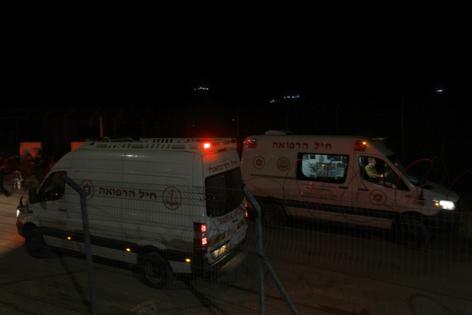Israel launches attack in Syria to protect Druze minority
Published in News & Features
Sectarian battles erupted in Syria on Wednesday, killing at least 16 security personnel and civilians in a suburb near Damascus, and drawing Israeli airstrikes against what Israeli leaders said were groups targeting the minority Druze sect.
The violence in the suburb of Ashrafiyah Sahnaya, about five miles southwest of the Syrian capital, came one day after a wave of clashes in the Druze-majority suburb of Jaramana. A monitoring group put the death toll at 17.
Later Wednesday, security officials said government forces had restored order, but the bloodletting cast fresh doubt on the ability of Syria's new Islamist rulers to impose their control over armed factions and to calm sectarian tensions that threaten to tear the country apart.
It has also provided an additional justification for Israel to intervene in its northern neighbor. Israel views Syria's fledgling government as a jihadi threat on its borders that it must counter, both to protect itself and its neighbor's Druze minority.
Skirmishes began overnight, with reports of pro-government fighters sneaking through agricultural fields near the Druze-majority town of Ashrafiyah Sahnaya and clashing with Druze militiamen.
An unnamed security source quoted by the official Syrian Arab News Agency, or SANA, said fighting started when "groups working outside the law launched a coordinated attack on a government checkpoint and shot at civilian and security forces' vehicles." It did not specify with whom the attackers were affiliated.
Residents in Ashrafiyah Sahnaya and other Druze-majority areas near the capital reported that authorities were preventing motorists from going in and out of the area.
Videos released by an activist traveling with one of the Islamist factions depict battles that went on for hours in Ashrafiyah Sahnaya's streets, with fighters shooting antiaircraft guns and rocket-propelled grenades down boulevards emptied of residents.
The Druze, members of a religion with links to Islam, number around 500,000 people in Syria, most of them living in cities and towns south of Damascus. Many have familial ties to Druze communities in Lebanon and Israel.
Israeli airstrikes soon followed in what Israeli Prime Minister Benjamin Netanyahu and Defense Minister Israel Katz in a joint statement called a "warning operation" that "struck elements of an extremist group that was preparing to continue attacks on the Druze population in the town of Sahnaya."
"At the same time, a stern message was conveyed to the Syrian regime: Israel expects it to act to prevent harm to the Druze," the statement said. "Israel will not allow the Druze community in Syria to be harmed given the deep commitment to our Druze brothers in Israel, who are bound by family ties and history to their Druze brothers in Syria."
Israel has vowed to defend the Druze in Syria against what it says is a government led by extremists. Hours after the ouster of Syrian President Bashar Assad in December, Israel dispatched troops across long-established armistice lines into Syrian border villages, where they remain in place to establish what Israeli leaders have said is a buffer zone. It also informed Syrian authorities that government forces would not be allowed to move into southern Syria. Many in the Syrian Druze community reject Israeli intervention.
Though Druze celebrated the fall of Assad, they have kept at arm's length the rebel coalition that overthrew him and is now in charge; the coalition includes jihadi groups that once had ties to Al Qaeda. Despite repeated negotiations with government officials, Druze militias have refused to disband or to integrate under the Syrian army before an inclusive state is formed.
Fighting between the Druze and government-aligned factions was triggered on Tuesday after an audio clip purportedly of a Druze cleric surfaced in which he insulted the prophet Muhammad. The cleric, Marwan Kiwan, later released a video denying any connection to the clip, while the Syrian Interior Ministry confirmed in its initial investigations that Kiwan was not involved.
But by then, Sunni gunmen were already converging on the Jaramana neighborhood. Government officials and local leaders were able to stop the fighting in Jaramana before clashes began anew in Ashrafiyah Sahnaya.
The latest spasm of sectarian killings snarls the government's all-out effort to move beyond the country's 14-year civil war, which pitted Assad and his allies against a Sunni-dominated opposition comprising dozens of armed factions.
Authorities have so far been unable to corral those factions, many of which fought by their side during the civil war and are now putative allies in the country's new security apparatus.
The scenes Wednesday echoed those seen last month, when pro-government factions descended on Syria's coastal region and massacred more than 1,000 civilians. The massacres spurred a wave of global opprobrium, with the U.S., Europe and other world powers demanding guarantees that minorities' rights would be preserved before far-reaching sanctions on the country can be lifted.
In a statement Wednesday, Syria's Foreign Ministry said that it rejects all forms of outside intervention in its internal affairs and that it would "protect all segments of the Syrian people without exception."
©2025 Los Angeles Times. Visit at latimes.com. Distributed by Tribune Content Agency, LLC.







Comments